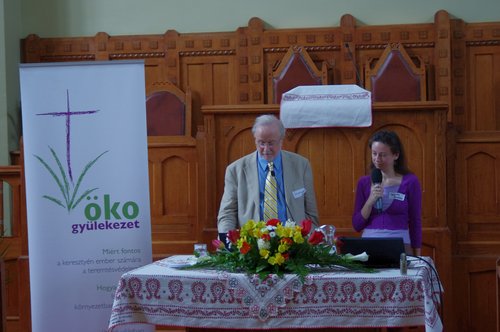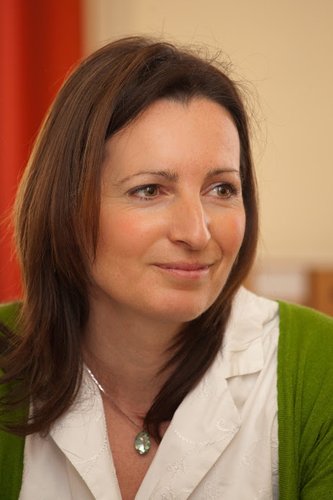How Natural Are We? – Eco-Congregation Conference in Budapest
2013. május 10., péntekThe Eco-Congregation Council of the Reformed Church of Hungary organized a conference on 27 April with the main topic of the conference focusing on the question: Our synthetic life: How natural are we inside?
Tamás Kodácsy, the member of the Eco-Committee has introduced the motto of the conference, and the lecturers. As he said in his welcoming speech: "Humans often consider themselves God" and quoted a sentence from Madách's famous drama.
The first lecturer, András Victor, the professor of environmental education in his presentation, entitled "Synthetic materials in our surroundings: pros and cons" discussed the negative and positive sides of using plastic. He presented wide-range of fields that are suitable for using plastics and its specific features. It seems that this kind of plastic is indispensable from our life. He highlighted the fact that making plastic is an viscious circle: industry produces worthless products, because we will throw away anyway, and we throw away these products, because they are worthless, and the circle ends. "The problem is not the fact that we use plastic, but we produce worthless products and we then throw them away." – he expressed in the main sentence of his speech.

Eszter Karsay, pastor of the Klauzal square congregation, focused her presentation on the natural and unnatural things in the Bible. Our first impression can be, that is natural what God created, but the nature of man is not natural? God gave freedom to man, and man can ruin what God created, and this is natural. – She pointed out.
Where is the limit of a sustainable Earth? –asked Alan Werritty the professor from Dundee University in Scotland during his presentation. The guest lecturer of the conference formulated three questions: How is the Earth's endurance? What are the irreversible global changes that are affecting the next generation? What is our responsibility? Currently we use one and a half planet, and by 2050 we will use three planets. We must take into account that the consequences will be catastrophic, if we won't decrease production levels. In Werritty's presentation, he showed in detail the ecological footprint of different societies as well as their carbon-dioxide emission. He emphasized the church's responsibility in the process. How can we help as Christians? – he asked. He summarized the answer for this question in three tasks. First of in spiritual life; pray and teaching. Secondly, the practical acts such as responsible power consumption and taking care using resources. Finally, he highlighted the importance of the day-to-day routine.

Werritty and his congregation are also using these principles. As he said, the St Andrew's Church is heated by modern technology in an energy-saving way. Besides this, they are also reducing car usage by coming to church together.. Nevertheless, he mentioned in his presentation the danger of global warming, and the melting glaciers and the unpredictable weather conditions as well as the, numerous species that are gradually disappearing from the Earth.
During the last part of the conference, Boglárka Szűcs the coordinator of the Eco-Congregation Committee summarized the most important results and plans of the committee. The goal is that more and more congregations become eco-congregations. She mentioned the brochures and publications as tools to achieve this goal, and emphasized that the average citizen must also be conscious about the problems of environment and form their habits towards these goals.
Translated by: Csilla Kuzma
Contact us
Click here if you are interested in twinning.
Reformed Church in Hungary
Address: H-1146 Budapest, Abonyi utca 21.
PO Box: 1140 Budapest 70, Pf. 5
Email: oikumene@reformatus.hu
English, German and Korean language services in Budapest
Links
Recommended articles
-
Pastoral Letter in the Light of the Pandemic
Bishop Dr. István Szabó sent a pastoral letter of encouragement to the ministers serving in RCH’s congregations, expressing his gratitude for the persistence and creativity of the pastors.
-
RCH Joins in Pope's Call for Prayer
RCH published the call on congregations to join the initiative of Pope Francis, supported by ecumenical organisations, to unite in praying the Lord’s Prayer on Wednesday, 25 March, at noon.
-
English Speaking Worship Services Online
Each Sunday at 11 AM (CET) the St. Columba's Church of Scotland in Budapest, the international community of RCH invites you to join the worpship service on its facebook page.
-
Test of Humanity and Companionship
Reformatus.hu asked Dr. György Velkey, Director General of the Bethesda Children’s Hospital of RCH about the challenges of health care workers and ways of prevention against the pandemic.
-
All Church Events Suspended
In light of the coronavirus the Presidium of RCH requested congregations to suspend all church events with immediate effect. Beside restrictions, it calls for prayer, sobriety and responsibility.











